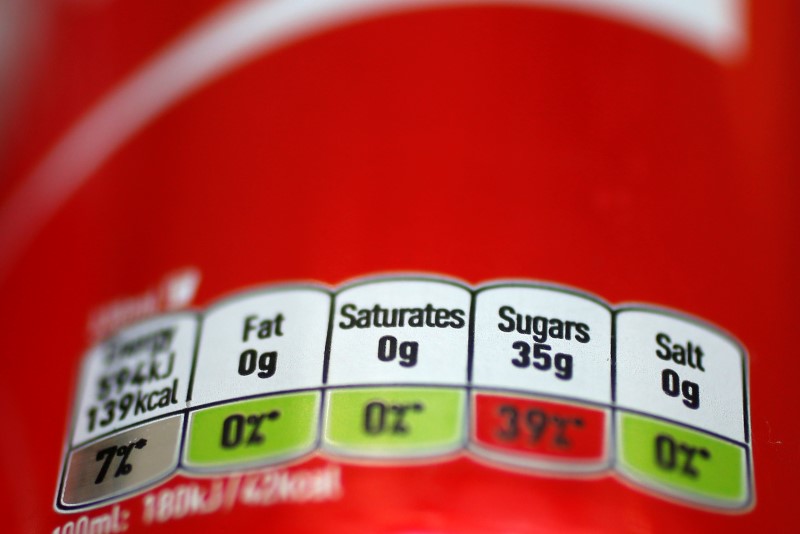By Martinne Geller
LONDON (Reuters) - The British government's planned levy on sugary soft drinks means more business for suppliers of specialty ingredients that boost sweetness without adding calories and can mask aftertastes or add texture.
The surprise levy announced on Wednesday would go into effect in two years. That gives manufacturers including Coca-Cola (N:KO) or PepsiCo (N:PEP) and their UK partners such as Coca-Cola Enterprises (N:CCE) or Britvic (L:BVIC) time to roll out more low-calorie drinks.
Beneficiaries could include PureCircle (L:PURE), which sells the natural low-calorie sweetener stevia, Tate & Lyle (L:TATE), which sells sweeteners such as sucralose, and Kerry Group (I:KYGa), which sells natural flavours and coloring agents.
Such companies are profiting from growing demand for lower-calorie foods and are free of competition from independent start-ups or own-brand players, since they often supply all major manufacturers.
They are also high-margin, high-growth and have high barriers to entry, said Neil Brown, investment manager of pan European equities on Alliance Trust's Sustainable Investment team. His fund has owned shares of Kerry and peers Chr. Hansen (CO:CHRH), Naturex (PA:NATU) and DSM (AS:DSMN) for years.
"Obesity is a serious issue, and most of us are trying to eat more healthily," Brown said.
"We'd rather be in the company that gets the phone call to try and fix it, rather than the company that faces clear headwinds."
U.S. firm Ingredion (N:INGR), which sells corn syrup and other ingredients, has seen "double-digit" growth in its specialty ingredients business in Mexico since that country implemented a tax on sugary drinks and foods in 2014.
"It created an environment for a company like ours to come up with affordable, healthy solutions," CEO Ilene Gordon told Reuters recently.
"We quickly took formulations that we had in the rest of the world, solutions from Europe, and we adjusted them for the Mexican market, in flavor, taste and affordability," she said, citing as an example a Mexican yogurt that Ingredion reformulated using a less expensive starch.
WORK IN PROGRESS
For Investec analyst Nicola Mallard, the two-year window before implementation of the UK levy is a sign the government wants manufacturers to reformulate drinks, rather than merely raise prices, which can have limited effect if people get used to the new price and eventually return to old habits.
"The easiest way to get people to consume less sugar is to not put it in the product in the first place," Mallard said.
Yet Coke, Pepsi and others have been changing their product line-ups for the past decade, adding more lower-calorie juices, teas and water drinks as well as low-calorie versions of their flagship colas, to match consumer demand.
"If you go back 20 years, the proportion of low- or no-calorie products on the market was 30 percent," said Gavin Partington, director general of the British Soft Drinks Association. "Now it's about 60 percent," including bottled water.
In January, for example, Coke announced a "one brand" approach to marketing its flagship cola that allows for the classic full-calorie version in red packages, but also Diet Coke in silver, Coke Zero in black and most recently, Coke Life in green.
The variety means Coke never has to change the recipe of the classic cola, said Liberum analyst Robert Waldschmidt, though it has changed the recipe for Coke Life in the UK.
Instead of one-third less sugar as it had for its 2014 launch, the new mid-calorie Coke Life has 45 percent less, due to the addition of more stevia, which comes from a South American shrub.
"Reformulation is biggest on new products because there's no preset notion of what it should taste like," Waldschmidt said.
Brands are reluctant to change recipes too fast, he said, citing last year's rocky performance for Diet Pepsi in the United States after it replaced aspartame with sucralose.
Consumers complained of an unpleasant aftertaste in the new version, which highlights the opportunity for a class of specialty ingredients that do not provide sweetness or flavor, but have functional benefits like masking an aftertaste, boosting a sweetness, or providing bulk or texture.
There will also be growing demand for ingredients such as Tate & Lyle's Dolcia Prima, made from allulose, which has 70 percent of the sweetening power of sugar but only 10 percent of the calories.
Allulose, which occurs naturally in figs, raisins and jackfruit, can be used in the United States, but has not yet been approved in Britain.

(This story has been corrected to remove incorrect reference to sugar in paragraph 10.)